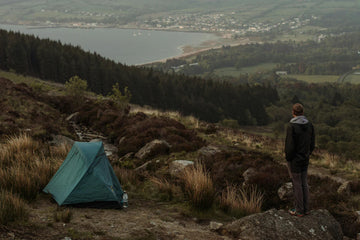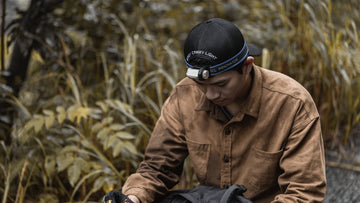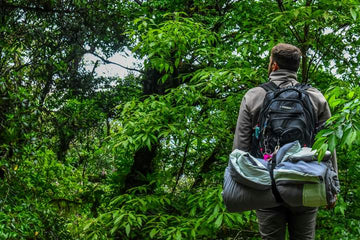
Do you long to pack up your gear and experience nature without reserving a campsite or listening to your neighbor's radio?
Are you an outdoor gear enthusiast looking to test their gear? If you want to camp under the stars and stay away from crowds and pitch numbers, your next camping experience should be wild camping.
What is wild camping?

Wild camping is camping in its most primal form. Adventurous types gravitate towards this style of camping because it requires less planning than other types of camping and takes you into the woods, making you feel like a true explorer . Often referred to as free camping, boondocking, or "roughing it," wild camping is camping without amenities . Instead of paying to hook up your caravan to electricity or set up at a designated picnic table and fire pit, you camp off the grid. Wild camping includes both backpack camping, car camping, and overlanding .
Advantages and challenges of wild camping
Life, or camping, is what you make of it. Wild camping has phenomenal benefits and some challenges, but what's a camping trip without a few challenges? One simple benefit is that wild camping is usually free. There are some exceptions to this rule in areas that limit the number of backcountry campers, such as the national parks out west. However, in most areas that allow wild camping, it is free. Since there is no cost, specific sites cannot be reserved or occupied. Exploring and finding a suitable campsite is a task that many campers enjoy. However, for some, especially newbies, finding a spot can be daunting. Being away from the crowds is one of the biggest benefits. While you don't have to worry about noisy neighbors, you do have to be self-sufficient. Wild camping means there is no electricity, water, or toilets.How do you wild camp?
As mentioned, wild camping is much more free-wheeling than other camping styles; the only rule, aside from basic camping ethics, is that it should be in an area where wild camping is allowed. Yes, it's true that you can explore the wild terrain to your heart's content, but camping in national parks is often regulated. Luckily for the free camping adventurer, BLM (Bureau of Land Management) and US Forrest Lands allow wild camping in most of their lands. Even better, these public lands often border parks, making them ideal areas to camp at night and still enjoy the parks' views and trails, all for less money. All that's needed is a quick check to see if the area allows camping. It's much easier to talk to a ranger or official BEFOREHAND than to do so after setting up camp. Several apps and forums will help narrow down your search and offer locations to camp. Some of these include:- OnX
- Sēkr
- www.boondocking.org
- Campendium.com
- freecampsites.net
Campers should note that not all states or counties have the same camping rules. States like Pennsylvania require campers to have a free permit to camp on state land.
Ethics guidelines for wild camping
Regardless of the style, the basic ethics of camping apply. These can be summed up in one sentence: "Leave no trace." The "Leave No Trace" mantra consists of 7 principles, which are:- Plan and prepare in advance - Knowing where you are going and what you need to get there reduces the risk of needing rescue and the impact of scouting.
- Travel and camp on durable surfaces - Stay on trails whenever possible and avoid walking on walking or soft terrain.
- Dispose of waste properly - There are no toilets or trash cans when camping. Dig a toilet hole at least 30 meters from a water source and take your trash with you when you leave.
- Leave what you find - Take only photos and memories; our public lands are for everyone's enjoyment.
-
Minimise the impact of campfires - Use a camp stove where possible to reduce the risk of fire. Always check that the fire pit is cool and the ashes are mixed to reduce the chance of embers igniting the area.

- Respect wildlife - Do not pet furry cows. All joking aside, practice catch and release when fishing and avoid disturbing animals to ensure the safety of both parties.
- Be considerate of others - Camp discreetly and avoid blocking the trailhead or road when camping with a vehicle.
Selection of suitable wild camping sites
Once you've found the general area you want to camp in, it's time to pick some campsites to explore. We recommend finding a few spots, as the requirements listed below may influence your choice when you eventually want to pitch your tent. In keeping with the camping ethics rules mentioned earlier, it's best to find areas that are used by other campers. Whether you're overlanding or hiking, the logic remains the same. Choosing a camp that's already cleared, with a fire circle or fire pit already set up, reduces the impact on the area by reducing the overall footprint of campers. Fewer cleared tent areas and new trails allow the environment to function as it should, and the beauty of these wild places is preserved.Find level ground. Soil with good drainage, especially in the rainy season, can make the difference between a comfortable night and a day with wet gear.
Vehicle campers or those wishing to drive to the trailhead should follow the trail. Only drive in areas that have already been traveled.

Always camp on bare ground. This will reduce damage to local plant life. Bare ground is also less likely to harbor ticks, ants and snakes, none of which make pleasant bedfellows.
Camp at least 30 meters from any water source. This distance is to prevent erosion and contamination.
National forests require that roadside wilderness campsites be a certain distance from the road, but these distances vary from site to site. For example, Sawtooth National Forest requires sites to be up to 300 feet from a road, while Utah's Fishlake National Forest allows camping within 50 feet of a road.
Essential equipment list for wild camping
Self-sufficiency is key when it comes to packing camping gear for a wild camping trip. The price we pay for escaping the crowds of other campers is that we forego the amenities that come with established campsites. No two campers are the same and no two trips will be the same, so consider this list the basics.- Water - Pack or provide one liter per person per day, plus a backup water filtration system.
- Food - If you are camping with a vehicle, you can keep some perishable foods cool; otherwise, freeze-dried or shelf-stable foods are your meal choice.
- Tent - Unless you are in a camper or RV and can sleep in the vehicle, you will need a tent. A sleeping bag and sleeping pad are also necessary.
- Maps/GPS - Don't assume your cell phone will have reception while camping. While a GPS is ideal, a non-powered option is also wise.
- Garbage bags - Remember to take away what you pack.
- Shovel - A hand shovel is enough for digging toilet holes. It is also useful for making a trench around your tent.
- Bear Canisters or Smell Proof Bags - If the site is in bear territory and there are no bear lockers, a canister or a way to keep food out of bear reach is necessary.
- Safety items include a whistle, compass, flashlight, knife, tire repair kit and a first aid kit with daily medications.
- Power - Batteries, a power bank or a solar charger are a good idea to keep your lights and appliances running.

Wild camping is nature exploration at its best. Escaping the hustle and bustle of commercial campgrounds while enjoying the peace and wonder of nature is why we camp. The planning, excitement, and the few dollars saved by free camping are further indicators that this style of camping deserves more recognition. Whether you're camping at Big Cypress in Florida or camping on BLM land near Joshua Tree, the thrill of leaving no trace while making memories is an experience every adventure seeker craves. So pack your bag, charge your flashlight , and find a spot off the beaten path. Go wild camping and be free.
Related Articles




